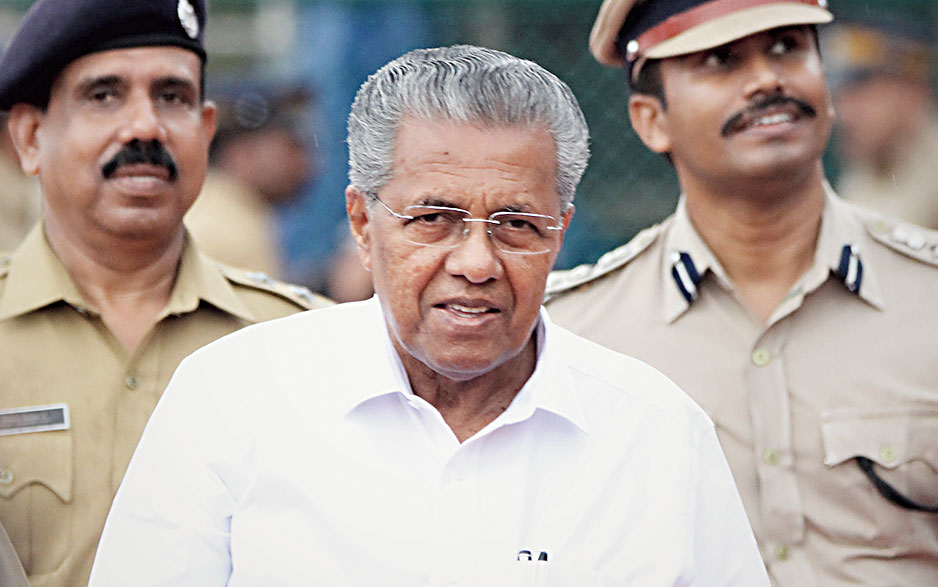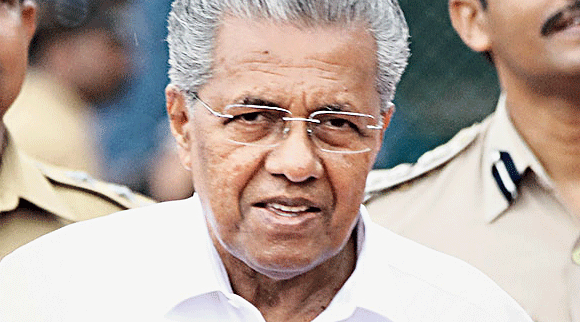The CPM, usually quick on the draw to accuse the Narendra Modi government of crushing free speech, is now finding itself at the receiving end and facing the music from fellow-travellers and kindred spirits.
The Left government in Kerala, headed by chief minister Pinarayi Vijayan, has promulgated an ordinance that allows prosecution and imprisonment of up to three years “for making, expressing, publishing or disseminating any matter which is threatening, abusive, humiliating or defamatory”.
The stated reason for the amendment to the Kerala Police Act is an explosion of online abuse of women by trolls, which recently prompted a group of women to beat up a YouTuber, and character assassination by some websites that masquerade as news portals.
But many suspect that the real trigger is the blizzard of negative coverage and lampooning the CPM-led government has suffered in the wake of the unearthing of a gold smuggling scandal that has been linked to a woman close to an IAS officer who ran the chief minister’s office. The officer, now in judicial custody, was removed soon after the controversy broke.
On Sunday, chief minister Vijayan kept a window open, saying that the government “will certainly consider creative opinions and suggestions that are being aired with regard to this amendment”.
The ordinance has brought national glare to bear upon the Kerala government, which had been basking in a blaze of media adulation over its Covid management until the gold scandal swung the pendulum to the other end.
The amendment has been inserted as Section 118 (A) in the Kerala Police Act.
The controversial provision reads: “Whoever makes, expresses or publishes or disseminates through any kind of mode of communication, any matter or subject for threatening, abusing, humiliating or defaming a person or class of persons, knowing it to be false and that causes injury to the mind, reputation or property of such person or class of persons or any other person in who they have interest shall on conviction be punished for a maximum term of three years or fined Rs10,000, or both.”
It is the broad-based nature of the penal provision that is causing the uproar.
The definition or Section 118 (A) also goes against the spirit of the CPM’s Lok Sabha election manifesto that promised to repeal the sedition law and the defamation law.
“Section 118” has now become a butt of ridicule in Kerala with trolls wise-cracking that one way to torpedo the amendment would be to ask Modi to promulgate a similar one at the Centre, which is certain to make the CPM oppose it.
Analysts feel that the ordinance is bringing back to the statute books a provision that had been struck down by the Supreme Court in 2015 in the Shreya Singhal case.
According to the Internet Freedom Foundation, the court had struck down Section 66A of the Information Technology Act, 2000, and Section 118 (d) of the Kerala Police Act, 2011, for violating the fundamental rights guaranteed by the Constitution under Article 19(1)(a).
The Internet Freedom Foundation said: “The Shreya Singhal decision highlights the need to ensure that overbroad restrictions on online speech are not used as a tool by the State to criminalise free speech on the Internet…. The introduction of the amended provision in question is concerning because of its similarity to the unconstitutional S.66A. The provisions suffer from a similar vice of being void for vagueness.”
“The Supreme Court was of the view that these penal provisions were not precisely definable. The result is that they get an elastic character and you can stretch them to any level,” senior lawyer Kaleeswaram Raj told The Telegraph.
“The government can bring even an innocent comment under the ambit of such provisions. That’s why the Supreme Court observed that an overbroad penal provision is intrinsically unconstitutional,” he added, urging the Kerala government to scrap the law forthwith.
Several public figures who are usually aligned with the Left in the fight against Right-wing forces joined the chorus of voices against the ordinance.
Prominent among them was former Union home minister P. Chidambaram. “Shocked by the law made by the LDF (Left Democratic Front) government of Kerala making a so-called ‘offensive’ post on social media…,” he tweeted, adding “how will my friend @SitaramYechury, GS, CPI(M), defend these atrocious decisions?”
Lawyer Prashant Bhushan tweeted: “Kerala has amended the Kerala Police Act by ordinance that provides jail term for any social media or cyber post that is deemed ‘offensive’ or threatening. This is draconian & bound to be abused to silence dissent. Similar Sec 66A of the IT Act was struck down.”
Shashi Tharoor, the Congress leader who represents Kerala capital Thiruvananthapuram in the Lok Sabha, tweeted: “This is troubling…. The law responds to several cases of offensive tweets/posts/comments abusing & threatening women, but it is so loosely drafted that it could also be used against political opponents, journalists & critics.”
Senior lawyer and media commentator Sebastian Paul, who had won Lok Sabha and Assembly polls as an LDF-backed Independent, called for the withdrawal of the clause. “In my view, the ordinance itself is dangerous and undesirable. Freedom of expression will be totally at the mercy of the police once this clause comes into force,” Paul told this newspaper.
“Under the guise of regulating social media, the entire media including newspapers have come under police control with this provision. This has the likelihood of extensive misuse,” said Paul. “Freedom of expression is a sacred right. How can policemen be guardians of that right?
He noted that there were sufficient laws to handle cyber bullying and there was no need for a new clause.
Asked for a response on the backlash and whether the ordinance weakened the party’s fight against the BJP, Yechury shared a statement issued by Vijayan.
The chief minister said the new amendment “will in no way be used against free speech or impartial journalism”.
According to him, the state government had repeatedly been receiving complaints against the wide misuse of social media, especially by certain online channels.
“Even prominent public and cultural figures had made such complaints. They have brought to the notice of the government instances where inhuman and vile cyber attacks were carried out by some in the guise of journalism and how it harmed the family lives of many. It has often turned into targeted attacks using untruths and sleazy content. Many families are bearing the consequences of such attacks,” Vijayan said, adding that this included women and transgender persons.
“Along with ensuring the freedom of press, the government also has the responsibility of upholding a citizen’s individual freedom and his/her dignity as enshrined in the Constitution. The popular idea that one’s freedom ends where the other’s nose begins needs to be respected. One has the liberty to swing one’s fist, but it ends where the other’s nose begins. However, there have been instances of this idea being repeatedly violated…,” Vijayan added.
“A person’s respect and dignity are essential in a modern society. It has constitutional validation as well. The government has the responsibility to ensure it. In general, traditional media functions within these constitutional limits. However, certain online media outlets have scant regard for such constitutional provisions and behave as if anything goes, creating an atmosphere of anarchy. This will alter our social order, and it cannot be allowed,” the chief minister added.











